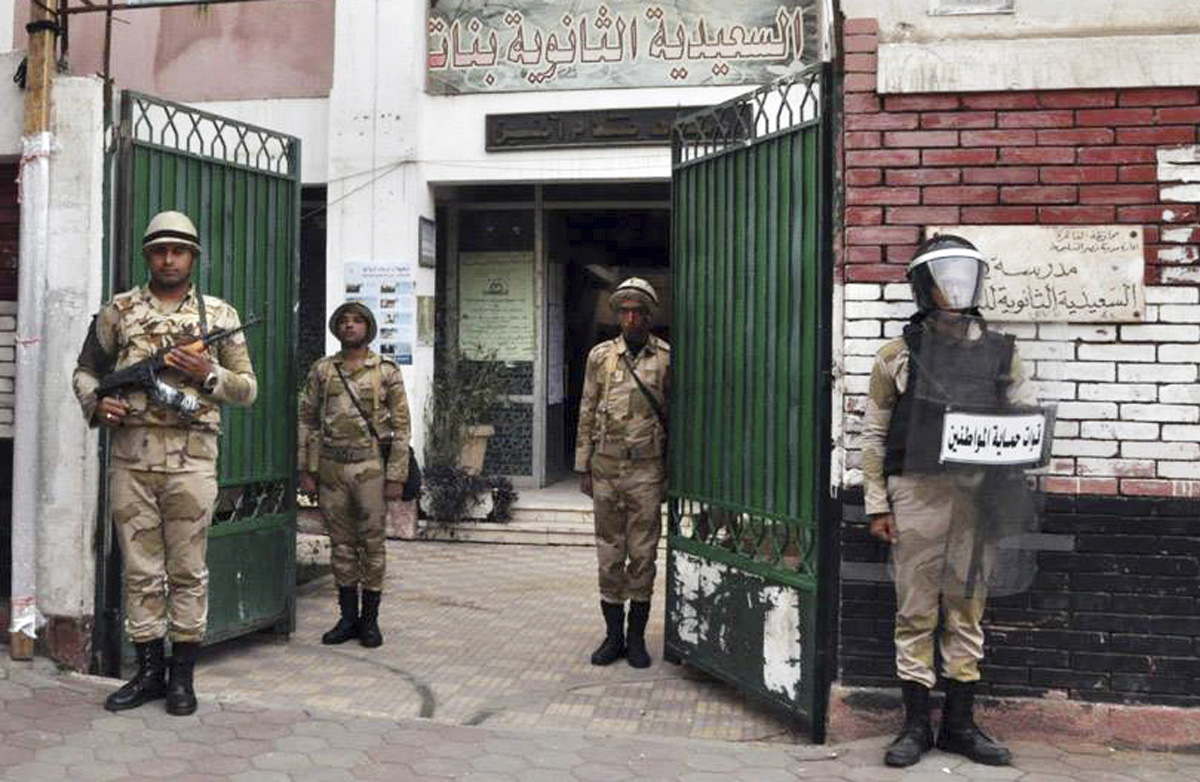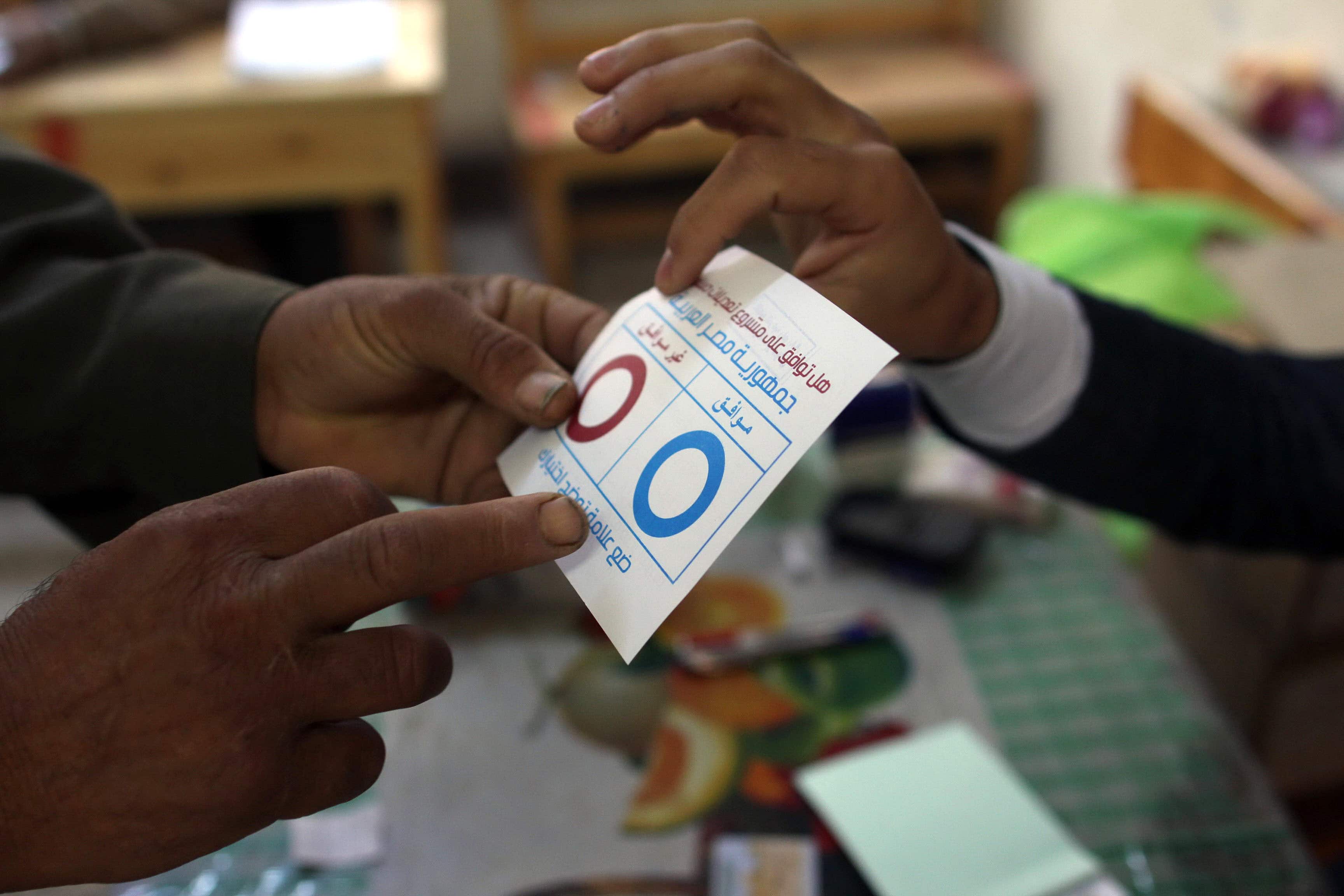Egyptian voters have overwhelmingly approved the new military-backed constitution giving General Abdel Fattah El-Sisi the legitimacy he seeks to strengthen the army's grip on the country. Although it is considered preferable to the last constitution, local rights groups have voiced their reservations regarding its efficacy.
The first step in General Abdel Fattah El-Sisi’s roadmap to “democracy” has been implemented.
A new charter has replaced the 2012 constitution drafted during former President Mohamed Morsi’s short-lived presidency giving Sisi the legitimacy he seeks to strengthen the army’s grip on Egypt’s political system. Over 98% of participants voted in favour of approving the new constitution. According to officials, the voter turnout was 38.6% of the Egyptian population – higher than the 33% who voted on the constitution presented during Morsi’s tenure.
There was little doubt the new military-backed constitution would pass. On the first day of the voting process, polling stations featured women ululating in celebration, Egyptian flags being waved, and soldiers carrying flowers handed to them by people displaying their support for the army.
Even weeks earlier, there were signs that the referendum was on a sure path to success. Endorsements for the charter flooded both state-run media outlets and private TV and radio stations. In Cairo streets, billboards and ad campaigns fervidly urged Egyptians to vote “yes”.
Although the public is being reassured that the revised charter is preferable to the 2012 Muslim Brotherhood version, local rights organisations have voiced their reservations regarding a few of the constitution’s provisions.
The Cairo Institute for Human Rights Studies (CIHRS) issued a statement warning people that this latest version of the constitution does not provide for a political system that will guarantee and protect the rights and liberties it allegedly recognizes.
CIHRS pointed out that abuses have already occurred and continue to occur in flagrant violation of a constitution “whose ink has barely dried.”
“The entire process has been conducted with a meager attempt at fair public debate,” wrote Mohamed El Dahshan, a senior research fellow at the Harvard University Center for International Development.
Spotting any posters calling for a “no” vote has been nearly impossible. One journalist who had visited polling stations on 14 January in search of someone voting against the referendum resorted to Twitter to ask: “Has anyone managed to find a “no” voter?”
Freedom of expression still under threat
The referendum and the subsequent passing of the constitution come in the midst of a widening government crackdown on dissent.
Last week, Human Rights Watch reported that seven members of the Strong Egypt party, a political party led by former presidential candidate Abdel Moneim Aboul Fotouh and that had initially been in support of the coup, were arrested on three separate occasions for hanging posters calling for a “no” vote.
Prosecutors detained one party member on charges related to alleged involvement in terrorism. Three others, apprehended on 12 January, were accused of “attempting to overthrow the regime, provoking citizens to reject the constitution, and engaging in incitement against the police and army.”
Despite the inclusion of a provision that bans the prosecution of journalists for ‘publication offenses’, at least seven journalists are being held behind bars in the country today. Most recently, four Al Jazeera English correspondents were detained by the authorities for simply doing their jobs.
They have been accused of conducting “illegal meetings” with the Muslim Brotherhood and illegally broadcasting news that harmed “domestic security”.
Their case prompted an outcry from fellow journalists working for both international and local media outlets. The Committee to Protect Journalists (CPJ) wrote a letter addressed to interim President Adly Mansour demanding the jailed journalists’ immediate release.
Shahira Amin, a freelance Egyptian journalist and regular writer for Index on Censorship, pointed to another apparently favourable provision banning the closure of media outlets for what they broadcast or publish, saying it “would have been plausible had it come before all channels linked to the Muslim Brotherhood were shut down in the wake of the military takeover of the country in July.”
Unlike previous constitutions, this one includes articles that clearly grant rights to education and healthcare. Equality between men and women in economic, social, and political contexts is also guaranteed.
But similar to its predecessors, this constitution lacks the guarantees to prevent elected lawmakers from undermining the very rights it seeks to protect.
“Many articles indicate that parliament will regulate the exercise of such and such a right through the law, opening wide the door to restrictions and limitations on various rights,” wrote Khaled Mansour, the executive director of the Egyptian Initiative for Personal Rights (EIPR).
Freedom of assembly undermined
“Every Friday, no less than 500 to 600 get arrested,” said Interior Minister Mohamed Ibrahim in a press conference on 9 January 2013. “At the beginning, we used to wait for the demonstration to turn violent, but now we confront them once they congregate. When we confront them, there are some that run. But whoever we can grab, we detain.”
Along with thousands of Brotherhood supporters subjected to this grave violation of citizens’ right to demonstrate, four secular activists now languish in jail.
Ahmed Maher, Mohamed Adel, and Ahmed Douma, all men who were instrumental in the revolution that ousted former president Hosni Mubarak in 2011, were each sentenced to three years in prison for “organizing an unlicensed protest”.
Another iconic figure of the revolution, Alaa Abdel Fattah, was arrested and taken from his home on the night of 28 November 2013. He is being held at Egypt’s notorious maximum-security facility Tora prison.
All four activists were arrested for demonstrating against a recently introduced law criminalizing protests without prior permission from the authorities; a law that clearly invalidates a certain provision in the constitution hailed by supporters for “safeguarding” the right to freedom of assembly and demonstrations.
Military powers extended
Perhaps the most discouraging aspect of the constitution for secular activists and local rights groups is that it clearly enhances the military’s powers by granting it special privileges.
When compared to the previous constitution, the military’s budget is still shielded from legislative oversight; the constitution still allows civilians to face military courts for crimes that “harm the armed forces”; the military can appoint a defence minister for the next eight years; and a new Supreme Police Council has been created which must be “consulted in any laws pertaining to it”, effectively giving the Interior Ministry a veto over any laws reforming the police.
The formation of a non-military government was one of the key demands of the 2011 revolution that ousted Mubarak.
Three years on, “Sisi-Mania,” as some international media outlets have called it, has swept the nation, in part because of the Muslim Brotherhood’s failure at governing the country, and partly thanks to a robust media campaign portraying the army as heroes.
Of course, Sisi is far from being universally loved. Many groups, including the Strong Egypt party and the No Military Trials for Civilians group, have boycotted the referendum. The majority of Egyptians, however, yearn for the economic stability they believe Sisi’s roadmap will accomplish.
Up next on the road to “democracy” is a presidential election in which Sisi has hinted he might run for office.

Egyptian women supporting the army hold a poster showing a “Yes” vote and a picture of army chief General Abdel Fattah al-Sisi, beside a polling station in Cairo, January 15, 2014REUTERS/Mohamed Abd El Ghany

Egyptian soldiers stand guard in the courtyard of a school that will be used as a polling station in downtown Cairo on 13 January 2014REUTERS/Al Youm Al Saabi Newspaper



